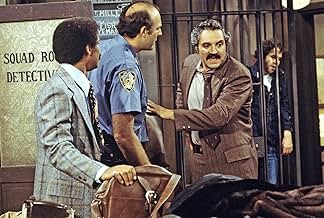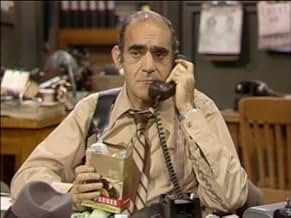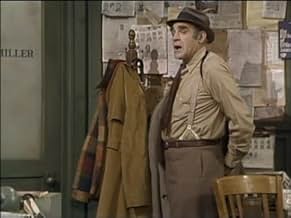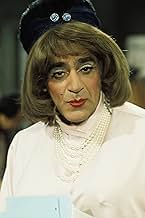El capitán del distrito 12 de la policía de Nueva York y su personal gestionan los diversos problemas locales y personajes que entran en la comisaría.El capitán del distrito 12 de la policía de Nueva York y su personal gestionan los diversos problemas locales y personajes que entran en la comisaría.El capitán del distrito 12 de la policía de Nueva York y su personal gestionan los diversos problemas locales y personajes que entran en la comisaría.
- Ganó 3 premios Primetime Emmy
- 9 premios ganados y 43 nominaciones en total
Explorar episodios
Opiniones destacadas
"Barney Miller" showed the gritty realism of police work in New York City in the 1970s, albeit with humor. Skits about the impending bankruptcy of the city, some of the futile criminal behavior (man stuck inside ductwork trying to burglarize a store), the mundane day in, day out existence of police officers with the occasional heart-pounding, adrenalin rush of excitement, and of course, what we in the profession called "the hairbags" - the old cops, forever full of stories, content to live in the past as Inspector Lugar exemplifies. To those who say "Barney Miller" is dated, I say the show is a timeless slice of life, and can be set in almost any locale and time period. The cast could not have been picked with any more brilliance, and the production was seamless. I say "Barney Miller" is a classic for the generations.
I am a fairly young person and I was very pleased to find such a wonderful show on DVD. The title of the show through me off, but after reading a bit about the show I was intrigued and bought it.
At first the show mainly focuses on the situations and what the cops are doing, but after a while the show starts to focus only on the squad-room where the detectives convene.
Barney Miller is always getting into other peoples business. When a criminal comes in he Interrogates them and tries to get the whole story out of them and also tries to put his own opinion or label on it.
Most of the stories are very light-hearted, but some do hit close to home. The show is funny, comical, and well played, but some episodes do have a serious vibe at the end of them.
By season three the cast is permanent and the show gets its real humor on. Each detective has an impressive amount of character depth. It was interesting to learn about each of them as I watched all of the episodes. By the end, I felt as if I knew each of them personally.
The only parts of the show I didn't like was Lt. Scanlon. His character was played so well, I truly didn't like him. Inspector Luger was played by a veteran actor, but his character seemed a little dim-witted. By the end of the series, the only set you would see is the squad room. After having visited a couple different stage sets (for example: Barnies apartment, Fish's apartment and the hide-out apartment) it seemed very confining to only use the squad room in the later seasons.
The exits of Fish and Yemada were torture on the show. Fish was great when it came to quick and ironic humor while nick tried to do the same, but his character was never truly replaced.
Overall, I love this show and I continue to watch it often. The humor, the stories, the backgrounds of the people are all interesting and entertaining. This show is recommended for all who love comedy and also recommended for all who wish to enjoy a simple show.
At first the show mainly focuses on the situations and what the cops are doing, but after a while the show starts to focus only on the squad-room where the detectives convene.
Barney Miller is always getting into other peoples business. When a criminal comes in he Interrogates them and tries to get the whole story out of them and also tries to put his own opinion or label on it.
Most of the stories are very light-hearted, but some do hit close to home. The show is funny, comical, and well played, but some episodes do have a serious vibe at the end of them.
By season three the cast is permanent and the show gets its real humor on. Each detective has an impressive amount of character depth. It was interesting to learn about each of them as I watched all of the episodes. By the end, I felt as if I knew each of them personally.
The only parts of the show I didn't like was Lt. Scanlon. His character was played so well, I truly didn't like him. Inspector Luger was played by a veteran actor, but his character seemed a little dim-witted. By the end of the series, the only set you would see is the squad room. After having visited a couple different stage sets (for example: Barnies apartment, Fish's apartment and the hide-out apartment) it seemed very confining to only use the squad room in the later seasons.
The exits of Fish and Yemada were torture on the show. Fish was great when it came to quick and ironic humor while nick tried to do the same, but his character was never truly replaced.
Overall, I love this show and I continue to watch it often. The humor, the stories, the backgrounds of the people are all interesting and entertaining. This show is recommended for all who love comedy and also recommended for all who wish to enjoy a simple show.
This show was one of the funniest in the history of television. The various characters that came in and out of the station made this show what it was. I really think the show was at its peak during the period when Abe Vigoda, Jack Soo and Steve Landesberg were all on the show together. However, once Vigoda and Soo were gone, the show seemed to shift to a more dramatic direction. This was especially evident in the memorial episode for Jack Soo. However, this was a highly influential show and if you look at Night Court, which was produced by pretty much the same team as this one, you will see some of the same qualities on that show that made this one great.
Of the thousands of American TV sitcoms ever produced, only a small portion of them are genuinely enjoyable and funny 40 years after their production. Barney Miller is one of those shows. More interesting than this fact, however, is that this show has many features atypical of its genre and time period:
1. Virtually all of the action (excepting a handful of scenes and the strange and mostly unenjoyable 'Wojo's Girl' 2-parter) takes place at a single location, the police station. In this way, the show is like a stage play, and of course, stunningly similar to the classic Kirk Douglas play & film 'Detective Story.'
2. There is almost no slapstick, no catchphrases, and no toilet humor.
3. Unlike the most popular sitcoms of the mid-1970's, such as 'All In the Family', 'Good Times', etc. none of the recurring cast play their characters broadly. None of them are shouting tyrants, cartoonish buffoons, dingy housewives, etc. Most of the regular cast played their characters toward the deadpan end of the comedic spectrum. (The recurring Inspector Luger, played by the great James Gregory, is gently buffoonish, but nothing like Ted Baxter or George Jefferson.) One episode is an exception to this rule, 'The Brownies,' which is one of the 10 funniest sitcom episodes ever produced. If you have seen this episode, you know why the characters were played differently this time around, and you know that the essence of the story is seeing the characters behaving different than usual.
4. With the exception of Barbara Barrie as the intermittent presence of the titular character's wife in the early episodes, there are no recurring female characters. (Just an observation, not saying this is a good thing for every sitcom.)
These facts argue in favor of the theory that artists who seek to create something of quality and durability should not always try to imitate. Doing something different can be good.
The writing and the performances are the essence of why this show is good. But also there is the faded paint and rumpled clothes, and the varying degrees of world-weariness in faces of Yamana, Fish, Capt. Miller, and Inspector Luger, which evoke the gritty, working class realities of old New York before a series of quasi-fascist mayors tried to reboot the city as a kind of fantasyland for rich people and tourists.
A final point of interest to which I will draw your attention is gentle and matter-of-fact way in which the cops interact with both 'criminals' and 'victims.' You won't see them trying to intimidate or torture criminals into confessions. There is an implicit message of compassion in this, along with the related notion that when the total circumstances of life are taken into account, the moral differences between people don't seem all that huge.
1. Virtually all of the action (excepting a handful of scenes and the strange and mostly unenjoyable 'Wojo's Girl' 2-parter) takes place at a single location, the police station. In this way, the show is like a stage play, and of course, stunningly similar to the classic Kirk Douglas play & film 'Detective Story.'
2. There is almost no slapstick, no catchphrases, and no toilet humor.
3. Unlike the most popular sitcoms of the mid-1970's, such as 'All In the Family', 'Good Times', etc. none of the recurring cast play their characters broadly. None of them are shouting tyrants, cartoonish buffoons, dingy housewives, etc. Most of the regular cast played their characters toward the deadpan end of the comedic spectrum. (The recurring Inspector Luger, played by the great James Gregory, is gently buffoonish, but nothing like Ted Baxter or George Jefferson.) One episode is an exception to this rule, 'The Brownies,' which is one of the 10 funniest sitcom episodes ever produced. If you have seen this episode, you know why the characters were played differently this time around, and you know that the essence of the story is seeing the characters behaving different than usual.
4. With the exception of Barbara Barrie as the intermittent presence of the titular character's wife in the early episodes, there are no recurring female characters. (Just an observation, not saying this is a good thing for every sitcom.)
These facts argue in favor of the theory that artists who seek to create something of quality and durability should not always try to imitate. Doing something different can be good.
The writing and the performances are the essence of why this show is good. But also there is the faded paint and rumpled clothes, and the varying degrees of world-weariness in faces of Yamana, Fish, Capt. Miller, and Inspector Luger, which evoke the gritty, working class realities of old New York before a series of quasi-fascist mayors tried to reboot the city as a kind of fantasyland for rich people and tourists.
A final point of interest to which I will draw your attention is gentle and matter-of-fact way in which the cops interact with both 'criminals' and 'victims.' You won't see them trying to intimidate or torture criminals into confessions. There is an implicit message of compassion in this, along with the related notion that when the total circumstances of life are taken into account, the moral differences between people don't seem all that huge.
How come there are not more TV shows like Barny Miller? This was one of the best TV shows on TV. The writing and characters were fantastic and even though it has a 1970's feel and look to it, the show still packs a punch.
Barney Miller dealt with important topics as gay police officers and the fact that even though they are gay, they are still valuable members of society.
There are not really and funny shows anymore. What is a TV viewer suppose to watch? Friends?? Paris Hilton washing a cow. Please give me something!!!
Barney Miller dealt with important topics as gay police officers and the fact that even though they are gay, they are still valuable members of society.
There are not really and funny shows anymore. What is a TV viewer suppose to watch? Friends?? Paris Hilton washing a cow. Please give me something!!!
¿Sabías que…?
- TriviaDuring its broadcast run, amid the many cop shows on television at the time, many real-life police officers considered this the show that best depicted the realities of police life.
- ErroresDetective Fish has inconsistent years of service with the department. In the season one episode "The Arsonist " he mentions being on the force for 25 years. In the same seasons episode "Fish" he remarks that he went to the academy in 1937, making him a 38 year veteran.
- Citas
Yemana: Then Fish runs in the alley and he leaps over us like one of those, what do you call those things in Africa that run and leap in the air?
Detective Ron Harris: Slaves.
- Créditos curiososAt different times in the production of the series Max Gail was credited as both Max Gail and Maxwell Gail.
- ConexionesFeatured in The 28th Annual Primetime Emmy Awards (1976)
Selecciones populares
Inicia sesión para calificar y agrega a la lista de videos para obtener recomendaciones personalizadas
- How many seasons does Barney Miller have?Con tecnología de Alexa
Detalles
- Fecha de lanzamiento
- País de origen
- Idioma
- También se conoce como
- The Life and Times of Captain Barney Miller
- Locaciones de filmación
- Productora
- Ver más créditos de la compañía en IMDbPro
- Tiempo de ejecución30 minutos
- Color
Contribuir a esta página
Sugiere una edición o agrega el contenido que falta








































